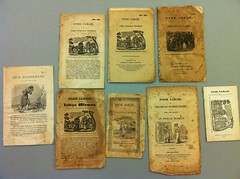
On 1 January 1820, the first part of a piece titled “Religion exemplified in the life of poor Sarah” was published in the Religious Intelligencer (page 439); the next week on 8 January the second part was published. A few months later it was reprinted in Boston Recorder (11 March 1820, page 44). In neither instance was an author indicated. Poor Sarah, or the Indian Woman, as the piece was often later known, was published as a tract in at least eight editions after 1820. In 1843, it was translated into Cherokee Syllabary and printed at the Park Hill, I.T. Mission Press established by Elias Boudinot (born Galagina/Kuh-le-ga-nah “Buck” Uwatie 1803?-1839). The translation has been attributed to Boudinot, and frequently the authorship of the English text has also been attributed to Boudinot.
Unfortunately these attributions are problematical. Poor Sarah is a story told from the perspective of someone who is supposed to have known the pious Indian woman Sarah in Connecticut between 1814 and 1817 (1818 in the first version). The narrator is described by Sarah as being a White woman. Uwatie was in Connecticut at the Foreign Mission School in 1818, having recently been converted to Christianity, and stayed with the missionary Elias Boudinot (1740-1821) whose name he adopted.
The Cherokee Boudinot established the Cherokee Phoenix newspaper, and was eventually brought into the “Treaty Party” dealing with the Treaty of New Echota, which eventually lead to Cherokee Removal and the “Trail of Tears.” Because of this, he and several of the other party members were murdered in 1839 (four years before the Cherokee translation of Poor Sarah was published by Boudinot’s press).
Special Collections holds several editions of Poor Sarah, including a copy of Sele Estemarrat, a rare Creek translation by Ann Eliza Worcester Robertson (1826-1905), mother of Alice Robertson, whose papers we also hold.

Pingback: Malaeska, the Indian Wife of the White Hunter | From McFarlin Tower